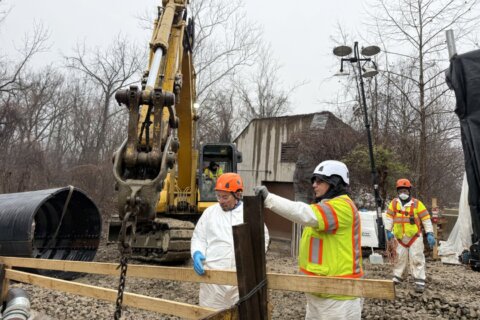Maryland’s Montgomery County is considering ramping up greenhouse gas emission requirements for more buildings.
As part of its goal of zero green house gas emissions by 2035, they’re considering proposed legislation from County Executive Marc Elrich to set Building Energy Performance Standards (BEPS) for existing county buildings.
“As this council has declared, we are in a climate emergency,” said Adam Ortiz, representing Elrich at the public hearing. “Commercial building energy use accounts for about 1/4 of the county’s GHG emissions.”
Ortiz said building energy performance standards are essential for the county to meet the goal of eliminating greenhouse gas emissions by 2035.
“While we have an ambitious pre-building code for new construction, we need similar requirements for existing buildings,” Ortiz said.
Under the proposed BEPS in Montgomery County, buildings would have to report their energy performance and meet set standards.
The council has amended Bill 16-21 to increase the performance requirements to include all buildings over 25,000 square feet. The original legislation had set the parameters to include buildings over 50,000 square feet.
Takoma Park City Council member Kate Stewart spoke in favor of the legislation, citing D.C.’s energy standards program as one to follow to reach the county’s climate goals.
“The D.C. program started in January 2021 and covers commercial and multifamily buildings of 10,000 square feet or greater and utilizes a complimentary technical hub to provide guidance and assistance to the public sector,” Stewart said. “We need to follow D.C.’s example and we have the opportunity to partner with them to leverage and expand the available resources of the regional technical hub.”
According to Stewart, there are 26 buildings in Tacoma Park that the BEPS ordinance would apply to, if enacted, and they include 16 multifamily buildings, two churches, schools and several office buildings.
“This represents over 2.8 million square feet, a significant increase from the 750,000 square feet from just seven buildings currently covered by the existing benchmarking law,” Stewart said.
While all who spoke at the public hearing were in favor of enacting BEPS, the National Housing Trust offered some words of caution.
“Affordable housing owners face several obstacles to improving the efficiency of their properties, including limited access to up front capital and limited staff capacity,” said Todd Nedwick, the senior director of sustainability policy for the National Housing Trust. “It is essential that grant funding and technical assistance be available to help affordable housing owners comply with the law.”
Nedwick says D.C.’s program offers money and technical assistance to those who need it.
“In D.C. specifically, legislation enacting BEPS required at least $3 million to be appropriated annually to assist affordable housing providers in complying with this performance standard,” Nedwick said.
If enacted the BEPS will impact almost 5,000 buildings in the county. Those who do not meet the standards could face a $500 fine for a first offense and $750 for additional offenses.
If the council votes in favor, the legislation could go into effect in the fall.
See the full council meeting below.








